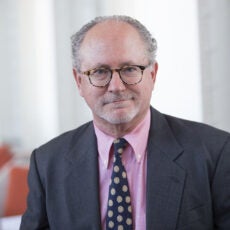
Anticipating COP26
As COP kicks off in Glasgow this week, wealthy nations playing fair will build the trust necessary for finance provisions.
This week, global leaders are convening in Glasgow, Scotland for COP26 where they will attempt to negotiate many aspects of the 2015 Paris Agreement, including key provisions in the Paris Rulebook. Perhaps most important, this meeting is meant to be the “finance COP,” at which meaningful negotiations will finally resolve a key provision of the original agreement: how the richer countries of the world will assist the poorer countries of the world in reducing their emissions while also ending that poverty itself. When economist Nicholas Stern refers to climate change as the “biggest collective action problem” in history, this is one of its most wicked aspects.
The pandemic delayed Glasgow by a year, but the agenda remains the same, and the world certainly has made little progress on climate in the face of a raging global pandemic.
We humans have pumped 2,500 gigatonnes of CO2 into the atmosphere since 1850, leaving less than 500 gigatonnes in a remaining carbon budget that gives the world a 50/50 chance to stay below global warming thresholds (1.5C or 2.7F) set in Paris. At the current rate, that leaves us just 11 years of global business-as-usual emissions. It’s possible to extend this runway out to 20 years if emissions peak soon. Sparing the scary list of climate impacts expected to happen after 1.5C of warming, let it suffice to say two things: first, the impacts from 1.5C warming will be very bad, and second, the promises (not yet achievements; only promises) made under the Paris Agreement would actually allow well over 2C (3.6F) of warming.
The U.S. promise for Glasgow is a 50% reduction (from 2005) in emissions by 2030. But Senator Manchin has vetoed the key provisions in a budget reconciliation designed to provide these reductions. The President arrives in Glasgow with a hastily crafted mashup of alternatives to the well-designed programs jettisoned in the budget reconciliation process. They will be unlikely to meet the promise.
But there is a larger point to be made. The U.S. promise of a 50% reduction is nowhere near our fair share of global reductions that other nations will rightly demand of us in Glasgow. A fair share for the U.S. would reflect both our responsibility (we have emitted far more than any other nation since 1850) and capacity (two-thirds of Americans are in the top 10% of the global income distribution, where most emissions come from.) A fair share for the U.S. has been estimated to be a 200% reduction—not 50% reduction—by 2030.
It is precisely because a fair share requires the U.S. to reduce our emissions to zero, and then again by the same amount below zero, that points to the importance of finance to COP goals.
In practice, this means that while the U.S. could not reduce the emissions of our entire economy to absolute zero by 2030, it could certainly reduce them by 50% or more and then provide the value of the remaining 150% in assistance to poorer nations reducing theirs.
As we face the greatest collective action challenge ever, we would be wise to remember the work of Elinor Ostrom, the first woman to win the Nobel Prize in economics. Market mechanisms only get us so far in solving collective action problems. Ostrom’s evidence suggests that common purpose pursued under rules based on trust is the way to address the tragedy of the commons.
Might we be failing to adequately address climate change largely because the wealthy nations of the world are failing to deliver the fairness needed to build the trust necessary to solve this collective action problem?
The Glasgow “finance COP” may well shape up to be remembered as the Glasgow “fairness COP.” And that would be a good thing for finance and fairness.
Mark Alan Hughes
Director EmeritusMark Alan Hughes is director emeritus of the Kleinman Center. During his time as faculty director, he led the Center and wrote on topics ranging from deep decarbonization to the future of Philadelphia’s energy landscape.

